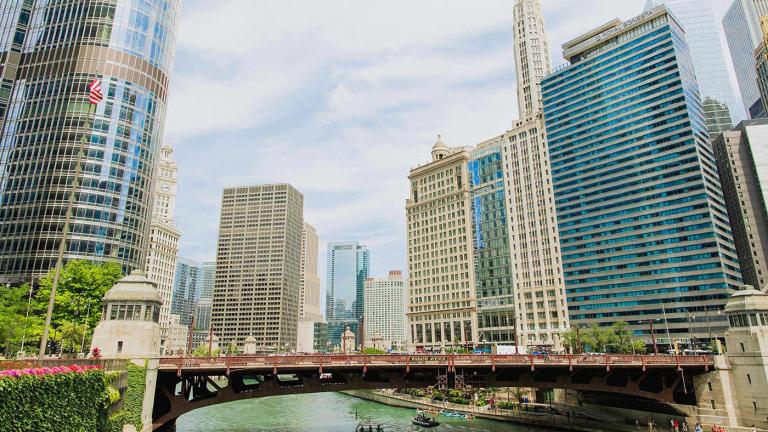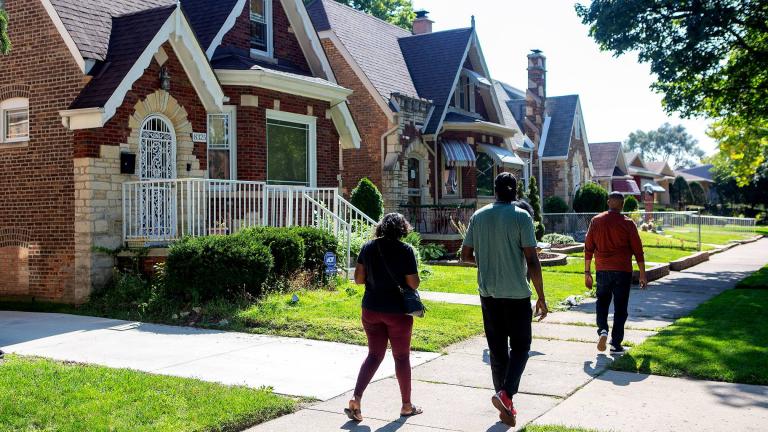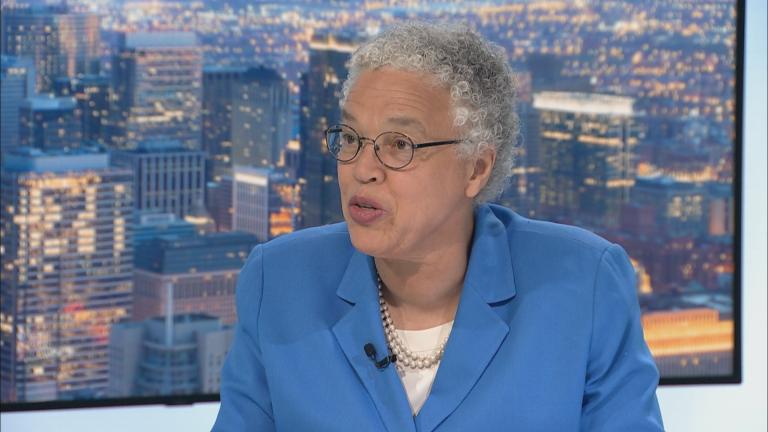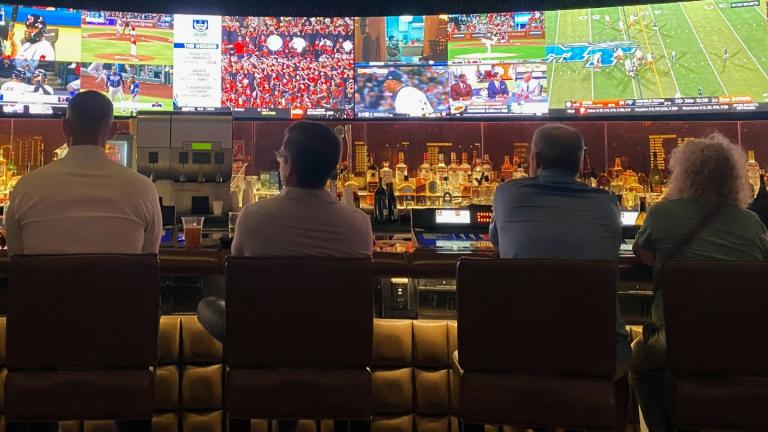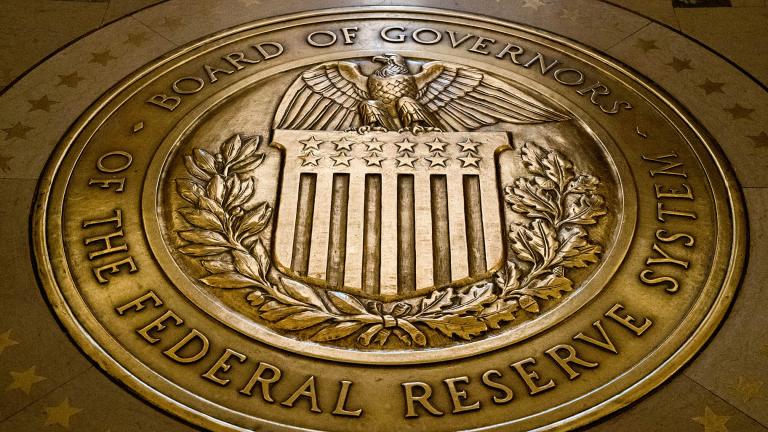The Federal Reserve has revised its forecast for inflation this year, predicting that core inflation — which doesn’t include the cost of food or gas — could rise to 3.4% by the year’s end.
Speaking after a two-day policy meeting, Fed Chair Jerome Powell said that while the economy is growing strongly, the U.S. is still down 7 million jobs as a result of the pandemic.
Powell also expressed concern that inflation could become an issue.
“The process of reopening the economy is unprecedented as was the shutdown at the onset of the pandemic,” said Powell. “And as the reopening continues shifts in demand can be large and rapid, and bottlenecks, hiring difficulties and other constraints could continue to limit how quickly supply can adjust, raising the possibility that inflation could turn out to be higher and more persistent than we expect.”
We discussed those comments with Martin Eichenbaum, professor of economics at Northwestern University and co-director of the Center for International Macroeconomics.
The Federal Reserve had a two-day policy meeting earlier this week. What were expectations going in for economists like yourself ahead of the meeting as to what the Fed might announce?
I thought we would get an outcome like the one we got. One, I think there was an acknowledgement that they were overly sanguine about the prospects of inflation picking up and getting into peoples’ heads. So if you look at their forecasts for March 2020 and what they thought inflation would look like over time they are clearly more worried now than they were then. They are more worried about the possibility that inflation could be persistently high, people will factor that into their heads, and then lots of bad things happen.
In March, the Fed forecast inflation would be 2.4% this year. Now it is saying it expects inflation to climb to 3.4% before the year’s end. How much of a worry is that?
That’s correct, but you have to be careful with that because if you strip out food and gas, they’re actually referring to core inflation. If you just look at actual – like all in – it’s substantially higher, it’s closer to 5% is their forecast.
How would you summarize where the Fed thinks the economy is at right now? What are the things Fed Chair Powell feels good about and what are the things that keep him up at night?
The Fed thinks the economy is recovering – and it clearly is. Now the question is how quickly and how strongly. But we all kind of agree that unless there is a crazy problem with the virus or a variant, we are recovering. The question is what does full recovery mean in this context? We’re down a bunch of jobs and the Fed thought we’d get them all back in terms of employment. But what you are finding is that a lot of people who have left the labor force because of retirement – they’re just not coming back. There’s a lot of people – I think it’s over 2 million. So then the question is that if you’re shooting at a target, should you be shooting at a target 2 million jobs higher? Or should you think we got it wrong, those guys retired, they’re not coming back. And if we push too hard, we are not going to get them back, we are just going to get a lot of inflation. That’s an example of the first order concerns (the Fed) has and the technical concerns they are balancing. And do they know the answer to that? Heck! Nobody knows.
Fed Chair Powell said Wednesday: “We really don’t have a template or any experience of a situation like this.” It’s a humble admission. How much is the Fed having to make this up as they go along as they respond to changing circumstances?
No two situations are ever identical. This one is much less identical than anything we’ve seen maybe in the history of the Fed … Now, making it up totally as they are going along? These are informed guesses based largely on theory – theory is a fancy way of thinking carefully – informed by fact. And critically, it is data based ... It’s important for the public to understand that this is a process whereby the Fed interacts with the data, and when the data changes they change their mind.
We’ve lived in a low-interest rate, low-inflation economy for so long that many people have never experienced what high-inflation can do to an economy. At what point does inflation become a problem? Why can it be so damaging to the economy?
What people have to understand is that you can talk about bond markets and all that stuff, which means relatively little to most people, but inflation is a regressive tax. It punishes the poor. It punishes people on fixed incomes. Every time inflation goes up, that’s like a pay cut. Unless you’re incredibly savvy, the odds are your wage increases won’t be the same as inflation. So, inflation goes up 10% and maybe you got a 5% pay raise – so you actually got a 5% pay cut.
Former Treasury Secretary Larry Summers, a Democrat, says he thinks policymakers are seriously underestimating the dangers of inflation to the economy. Is he right?
I’m very sympathetic to Larry’s general concern, but what I think this meeting said was they are paying attention to Larry … They’re upping the sensitivity of their antennae to – I don’t want to say they were wrong – but not giving enough weight to the possibility that inflation is on the rise and they really need to pay attention – and they are.
The Fed says that it thinks many of the inflationary pressures are likely to be relatively short-lived, caused by things like supply chain disruption due to the pandemic and a shortage of labor in some sectors. Is that your read on things as well?
My personal thoughts are – other things equal and if we weren’t dealing with human beings – I would say yeah, these supply-side shocks, give it a year and it’s going to work itself out. But we are dealing with real people, and here’s what keeps Chair Powell up all night – what if people aren’t perfectly all knowing, and they see inflation going up and they say I need to get a higher wage increase. And then they go to firms and bargain harder for higher wage increases, and the firm says my wages just went up. I’m raising prices ... So you see this spiral developing and once that spiral develops it’s really hard to stop because you’ve got to slam hard on the economy – and no one wants that scenario. So when that starts to develop, you either get ahead of it or you are going to have to have a heck of a recession – which really hurts poor people. Notice poor people get screwed here if the Fed doesn’t get it right either way. If inflation gets out of control poor people get screwed. If they have to slam the economy, then poor people get screwed. So the stakes in getting it right are really high.
Republicans are also arguing overly generous unemployment benefits are keeping people from returning to work. Do you see that as a significant factor in fueling inflation by driving the cost of labor higher?
Just think about common sense. If you’re a grocery store worker you can make more money at home in some states than going into the grocery store, working, and potentially getting COVID. I don’t think you’re a bad person for staying at home and saying they’re paying me to be safe.
The economy is still down roughly 7 million jobs compared to pre-pandemic levels, but the Fed expects the economy as measured through gross domestic product, to grow 7% this year, which would reportedly be the fastest rate of growth since 1984. How quickly would you expect that growth to translate into “full employment” – whatever you set that mark to be?
That is the gazillion dollar question – what is full employment? That’s to say, do we think everybody who retired is going to come back ... If you take them out of the mix and say I’ve just given up on those guys, then I think it’s reasonable to think that in a year or so, or maybe even faster, we’ll be back to where we were. If on the other hand you think that we have to have wages getting so high to lure back people who have retired, it’s going to take a lot longer. And it’s not clear that’s a reasonable expectation.
Is it a problem if people with the means choose to retire early? Does that do any harm to the economy?
I don’t think so. It’s one thing when a 25-year-old or a 40-year-old for that matter gets tossed out their job. Human capital is destroyed. We lose their productivity. We may have to give them support etc. It’s a terrible human tragedy and it’s bad for the economy. If a 65-year-old decides to retire to play golf and they have the means to do that – that’s fine.

